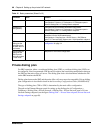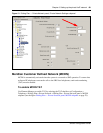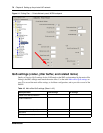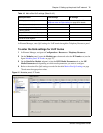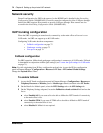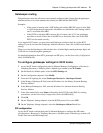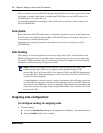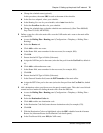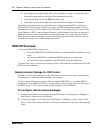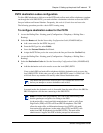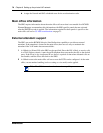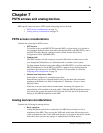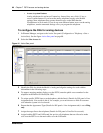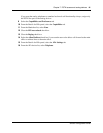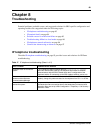
76 Chapter 6 Setting up the private VoIP network
NN40140-500NN40140-500
h In the adjacent Absorbed Length field, select the number of digits to be absorbed. The
Absorbed Length applies to the digits of the destination code only.
i In the Second Route field, enter 999 (the PSTN route).
j In the adjacent Absorbed Length field, select the number of digits to be absorbed.
Depending on the dialing plan, the destination code is integrated with the DN or is dialed as a
prefix to the DN. When a user calls the main office, the SRG examines the destination code to
determine the routing. If the First Route, the VoIP trunks, is unavailable, the call is routed to the
Second Route, the PSTN, and the External Number is called. Because Overflow was selected, if
both the First Route and the Second Route are unavailable, the call is routed using the Normal
Route specified in the Normal Route column of the Destination Codes table. Because Auto was
selected, the routing occurs without manual intervention.
SRG PSTN access
Access to the SRG PSTN is required for:
• calls to the SRG PSTN from SRG telephones or redirected SRG IP telephones in local
mode
• calls from the SRG PSTN to redirected SRG IP telephones in normal mode
• calls from main office telephones to the SRG PSTN, using the VoIP trunks
To achieve this access, a remote access package for the VoIP trunks and a destination code for the
PSTN must be configured.
Remote Access Package for VoIP trunks
The SRG views all calls coming in over the VoIP trunks as remote access calls, even though the
VoIP pathway is a dedicated trunk to another closed system.
To allow tandem dialing from the main office through the SRG PSTN, or to redirect SRG IP
telephones to use the SRG local PSTN, you must specify a remote package that provides access to
the PSTN line pool. This remote package is then assigned to each VoIP trunk.
To configure remote access packages
1 LocateSet up a remote access package for the PSTN line pool (Configuration > Telephony >
Call Security > Remote Access Packages).
2 Assign the package to each VoIP trunk (Configuration > Telephony > Lines > Active VoIP
Lines > Trunk Type column > Details for Line panel > Restrictions tab > Use remote package
field).



